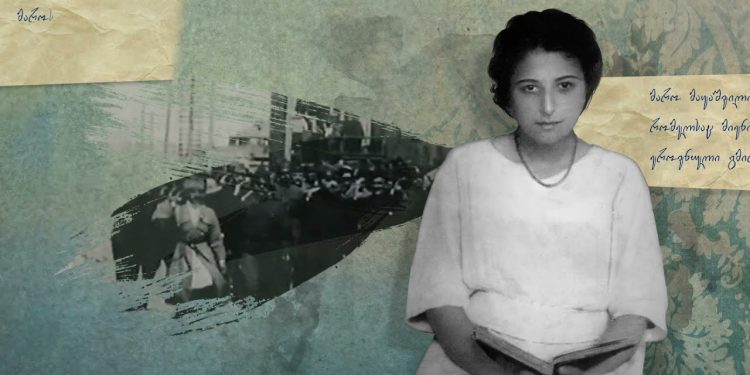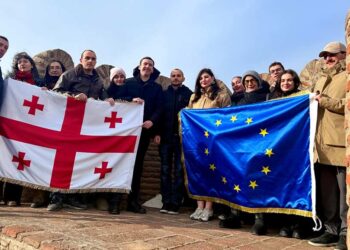On the night of February 11, 1921, the Red Army forces overwhelmed Georgian military outposts on the border and began their march toward the capital. This attack was in direct violation of the Treaty of Moscow, signed May 7, 1920, a peace agreement recognizing Georgia’s independence and establishing a basis for cooperation and peaceful coexistence.
Maro Makashvili was among the invasion’s first causalities. An idealistic and freedom-loving teenager, her diaries capture the hope and excitement that flooded Tbilisi during their few years of independence. On its pages, we meet a young girl coming of age in an independent Georgia, seeing friends, reflecting on literature, on feminism, and spying on the poet Paolo Iashvili with fascination. She scribbles down her thoughts on the social upheaval all around her and condemns the Russian aggression that was soon to take her life.
Carefree entries are punctuated by energetic interpretations of the historical events she witnessed firsthand. One section, entitled “Free Women in a Free Georgia,” discusses the ideals of equality for Georgian women. Another chapter describes her admiration for a father who cooked at home and helped with housework. She reads and studies diligently, while dreaming about traveling and studying in Europe.
Her father, Konstantine Makashvili was a teacher, a poet, and active member in the famous Society for the Spreading of Literacy Among Georgians—a charitable organization that played a critical role in countering Russification by promoting Georgian-language education. During the Democratic Republic of Georgia, Konstantine was also a member of the Constitutional Commission which drafted the country’s first constitution.
Many of the friends and relatives appearing in her diaries were later killed by the Soviets, while others fled for their lives. This cleansing was a necessary precursor for the project of Soviet social engineering which aimed to create an indoctrinated Georgian society in service to the fickle visions of the Communist party in Moscow.
On February 17, 1921, as the Bolshevik forces approached Tbilisi. Maro joined the war effort as a Sister of Mercy Red Cross volunteer. Her brother enlisted in the defense forces as a soldier. She was killed by mortar shrapnel on February 19 on the front line at Kojori, near Tbilisi.
On February 23, 1921, she was buried alongside fallen soldiers in the yard of the Saint Alexander Nevsky Military Cathedral of Tiflis.
The final insult to her memory would come in 1930, when the cathedral and its cemetery were demolished by the Soviet government and the graves lost. The new Government House of the Georgian SSR was built on top of the ruins. This is where the Georgian Parliament now stands on Rustaveli Avenue in downtown Tbilisi.
The passages below are excerpts from her diary dated February 23, 1919. The previous day, Maro and her classmates had hosted their final evening ball, akin to a high school senior graduation ceremony. The passage is notable not only for capturing the celebratory spirit of the Democratic Republic of Georgia, but also for the flamboyant appearance of a young Paolo Iashvili. Paolo was a prominent figure in the Order of the Blue Horns, a coterie of post-symbolist poets, known for their life affirming verses and later banned by the Soviet authorities. During the 1937-38 purges, Paolo tragically took his own life with a hunting rifle on the 2nd floor of the Writers’ Palace in Tbilisi while a denunciation meeting was unfolding in the rooms below.
In an obituary for Maro, a fellow Blue Horn poet Titsian Tabidze (executed December 16, 1937), wrote:
“For many years, people will call to mind the memory of the deceased, and much will be written about how she was taken from us—but for their friend, who fell for the greatest honor of Georgia, they will not be able to find words of mourning so powerful as when all of Tbilisi cried as one for her loss.”
The passages:
“February 23 (continued 24). 1919.
“Yesterday we had our big evening ball at school. What a state we were in beforehand. We were afraid it would be a disaster, but there was no need to worry. At 7 o’clock people started arriving. Before the concert started, some outsiders were there, students and little kids. That was annoying. Tamara Ilinishna put Keto, Vava, and me in the tea room. The buffet was excellent. We tried so many tasty things. At 9 o’clock the artists arrived: Vano Sarajishvili, Inashvili, Spitko. ”
. . .
“There were many people, and a fight almost broke out between some soldiers who were there, but they put a stop to it in time. At 1 o’clock, Paolo showed up. We greeted him and gave him flowers. Then Kopali came and all the good people stayed for the dinner. At one o’clock or half past, they sat down at the table. Paolo was tamada. At the auction, he got two thousand for the bottle of champagne. He shouted a lot but never grew tired. He called Keto and me to join him on the stage, and we held the bottle. Others collected money.”
. . .
“We started dancing. There was music and the piano was playing. We had an even better time here. It was my first time at such a party, and I have never had such a good time. They made me dance the Chechnuri. Paolo and Kopali never left my side. They were laughing, and I was happy to see that everyone I invited was having a wonderful time. At 5 o’clock, they laid out the food on an enormous table. At 4 o’clock Keto left. She was telling me to come too, but my friends wouldn’t let me. Our German teacher got quite drunk and was complimenting everyone. He was quite funny, drinking and dancing. Mr. Lelo also came all the way from Zugdidi for our evening. We were very happy to see him, and the feeling was mutual. After he had had a few drinks, he wouldn’t leave us alone and joked and teased us.
“During the dinner, the director congratulated us and wished us happiness. He said: “I want each of you to find your own opinions and live by your own ideas. Never do simply what others are doing—nothing is more dreadful.” Paolo and Kopali drank to that. Then alaverdi was with me. They played Chechnuri, and I knew they would want me to dance. I escaped and hid in another room. Everyone chased after me, “Princess! Princess! There’s no point in resisting! We won’t stop until you agree!” What could I do? So I agreed. By this point, Taso and Rtskhiladze were quite drunk. Taso could barely sit. Sometimes she would put her head on my shoulder, sometimes on Elo’s. I also kept giving her drinks. Rtskhiladze was almost dead. He was completely gone and muttering something. Oh, we were laughing so much!
“We decided to go home at 8 o’clock. They tried to stop us, but we left anyway, first the 6th class, and then the rest. The boys, Sunana, Media and I came out together. This was when the real fun began. All the way home I didn’t shut my mouth. We were laughing like crazy.
“When we left the school, Paolo broke a big branch from a tree and stood in the middle of the street, shouting, “Wake up, Minister Evgeni Gegechkori!” That is where Gegechkori is stationed. We went on, and whenever we came across someone in the street, he would shake their hand, tip his hat, even give them a kiss. Then he spotted a wheelbarrow, got inside and started shouting “I’m going to Mtskheta!” Patriarch Leonid was being crowned that day. He was soon escorted out of the wheelbarrow.
“Everyone came to the windows in their nightgowns to see what all the noise was about, but then would pull back in embarrassment when Paolo and Kopali tipped their hats and sent kisses. We came across a cart full of beets. Paolo gave the man 5 rubles and took four large beets, throwing one to us. He took one into a teahouse and asked them to make him some beet soup for dinner. He pushed one into a worker’s mouth. Two donkeys came by, and he sat on one and trotted around. When a tram would pass near us, they both bowed their heads and shouted “Здравствуй душечка! Оля, Маруся, Таня!..” Kopali and Tsitsishvili, the aviator, joined him. We approached the Treasury Theater and heard music. Then we saw the Georgian army with the Georgian flag on their way to Mtskheta. Kopali and Paolo bought two enormous bunches of violets, the biggest ones they had, to give to me and Sunana.
“We stood in the middle of the street, and as the army approached we started handing small bouquets to everyone, who then cried vasha! and threw them over their heads. The army stopped and sang a Georgian song in chorus. Paolo spoke in impromptu verse. Then we marched behind the army. People stared at us and others were peering at us from their windows. It was 9 o’clock. There were so many people. We caught up with the rest of our friends and went together. We laughed like crazy. We were standing in front of a shop when Paolo, Tsitsishvili, and Kopali saw a cook in a window with iron bars. They started teasing him as one would tease a beast, pointing fingers and grimacing. The cook lost his patience and splashed them with water. At a Tatar shop, Paolo went in and took a big apple, then shouted for the whole street to hear, “Maro, Makasvhili’s girl, apple, apple, catch the apple!” I barely caught it. Then he grabbed something and said to me “Here, look what I have for you!” I went over, and he put an onion in my hand.
“They insisted we go to Mtskheta, Sunana and I, by automobile, almost forcing us in, but we escaped. Our journey from the institute had taken two hours. We said goodbye. Kopali and Paolo kissed my hand with great ceremony, and I was home by 10. My mother was quite worried. She thought I must have stayed the night because of the rain, but then one thought after another would pop into her head. I was suddenly very tired. I had some tea and slept until dinner. Some guests came in the evening, but I was so slow. I was in a daze. They were laughing at me. They would ask me one thing, and I would answer another.”
By Ryan Sherman
Extracts translated by Ryan Sherman and Maia Tserediani from May These Ashes Be Light: Georgian Literature from the Soviet Shadow.














